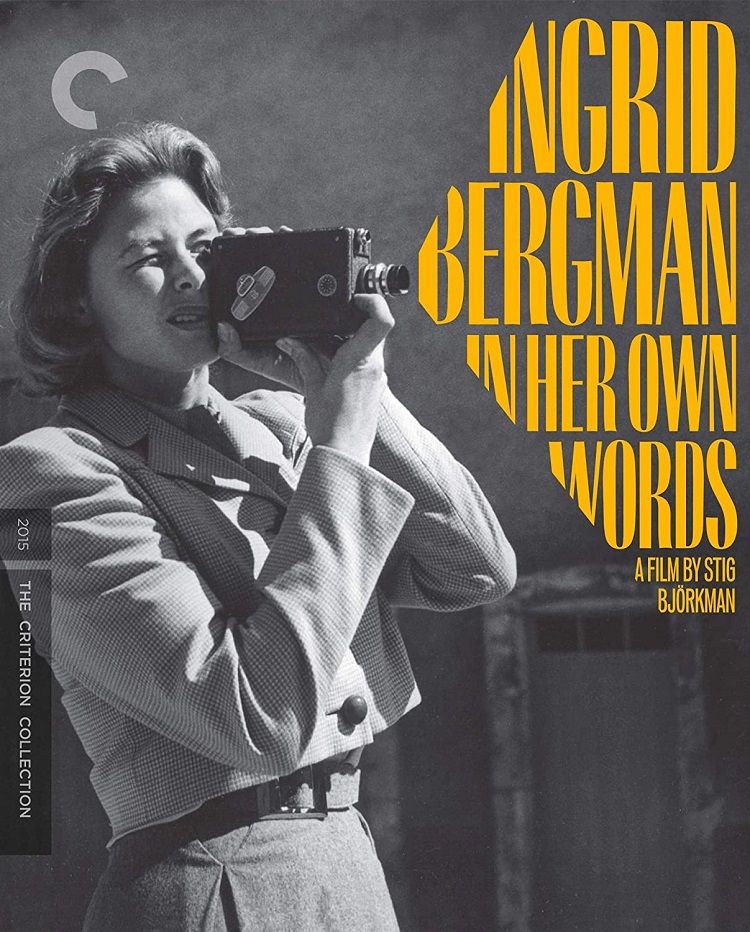
One of the best moments in Ingrid Bergman: In Her Own Words is one of the quietest. It’s just a makeup test for the young actress – maybe 45 seconds of her ravishing yet approachable face. She doesn’t speak, doesn’t really do anything, but she runs through an entire gamut of emotional states, from happiness to fear, pride, anger, infatuation, coy flirtiness and sadness. Like her fellow Swede Greta Garbo, and even this early in her career, she had that camera-ready communicative power that seems to be equal parts magic and mental telepathy.
The documentary also includes personal insights into the shy yet driven actress, from archival interviews with her plus present-day interviews with her four children (TV personality Pia Lindstrom, the product of Bergman’s first marriage, plus the three kids from her then-scandalous liaison with Italian director Roberto Rossellini). Director/co-writer Stig Björkman also uses a treasure trove of Bergman’s own home movies along with photos, diary entries, notes, and letters read by current “it” girl Alicia Vikander (Ex Machina, The Danish Girl).
So what’s the problem? There’s so much material that, charming as much of it is, it makes for a long two hours. The running time could have easily been cut by a third or more and still have provided a textured portrait of this tough yet vulnerable actress, who traveled “from saint to whore and back to saint again,” in the public’s eye but always kept a strong sense of herself in private.
A defining moment in her life came early: her beloved father died when Ingrid was only in her teens (her mother had died when she was still a toddler). The father loved photographing his daughter and she loved posing for him, and the shy child always felt more comfortable talking to imaginary friends than dealing with real people – and so a film actress was born. (It didn’t hurt that she had incredible beauty and great genes, passed down to her ridiculously good-looking offspring.)
This childhood phenomenon of “love coming through the lens,” as daughter Isabella Rossellini puts it, explains not only Ingrid’s career choice but also her private life, including extramarital relationships with photographer Robert Capa, director Victor Fleming, and Italian neo-realist pioneer Rossellini. Bergman’s move to Italy with the latter torpedoed her Hollywood career for nearly a decade, even bringing denunciations of her character from the floor of the U.S. Senate, but apparently she was eager for a change anyway. Much of In Her Own Words follows Bergman’s frequent reinventions of herself, signaled by her moves from Sweden to America, then to Italy, France, and finally London with her third husband, a theatrical producer.
We get some tantalizing info from the now-grown children, several of whom keenly felt the frequent absence of their mother but don’t seem bitter about it today. Daughter Lindstrom scoffs at the idea that any of them might write a Mommie Dearest-type memoir, saying that Bergman was too much fun to inspire a desire for such revenge.
Another interesting segment has actresses Sigourney Weaver (who worked with Bergman on stage when Weaver was starting out) and Liv Ullmann, her costar in the Ingmar Bergman-directed Autumn Sonata, along with Isabella Rossellini, herself an actress perhaps best known for Blue Velvet. What could be inside-baseball shop talk reveals more about Bergman’s acting processes and her impact as a person than the avalanche of home movies that fill in between these few bright spots.
I certainly wanted to like this documentary more than I did: Bergman has long been one of my favorite actresses. Her work for Alfred Hitchcock alone (Spellbound and especially Notorious) would be enough, but she also brought class and depth to synthetic entertainments like Indiscreet, Cactus Flower, and From the Mixed-Up Files of Mrs. Basil E. Frankweiler. I think Björkman couldn’t bear to leave anything on the cutting room floor, or felt the need to give the star her due with a full-length feature. But the old cliché applies here: less really would have been more.